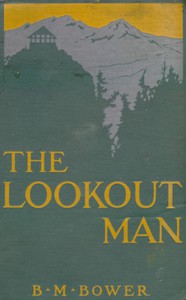The Lookout Man by B. M. Bower (good books to read for adults .txt) 📗

- Author: B. M. Bower
Book online «The Lookout Man by B. M. Bower (good books to read for adults .txt) 📗». Author B. M. Bower
He ate as slowly as he dared and as long as he could swallow, and when he left was lucky enough to find the office occupied only by a big yellow cat curled up on the desk with the pen between its paws. It seemed a shame to disturb the cat. He went by it on his toes and passed on down the steps and into the full face of the town lying there cupped in green hills and with a sunshiny quiet that made the world seem farther away than ever.
A couple of men were walking down the street and stopping now and then to talk to those they met. Jack followed aimlessly, his hands in his pockets, his new Stetson—that did not look so unusual here in Quincy—pulled well down over his eyebrows and giving his face an unaccustomed look of purposefulness. Those he met carried letters and papers in their hands; those he followed went empty handed, so Jack guessed that he was observing the regular morning pilgrimage to the postoffice—which, had he only known it, really begins the day in Quincy.
He did not expect any mail, of course; but there seemed nothing else for him to do, no other place for him to go; and he was afraid that if he stayed around the hotel some one might ask him to register. He went, therefore, to the postoffice and stood just outside the door with his hands still in his pockets and the purposeful look on his face; whereas no man was ever more completely adrift and purposeless than was Jack Corey. Now that he had lost himself from the world—buried himself up here in these wonderfully green mountains where no one would ever think of looking for him—there seemed nothing at all to do. He did not even want to go fishing. And as for journeying on to that lake which the peanut butcher had talked so much about, Jack had never for one minute intended going there.
A tall man with shrewd blue eyes twinkling behind goldrimmed glasses came out and stood in the pleasant warmth of the sun. He had a lot of mail under his arm and a San Francisco paper spread before him. Jack slanted a glance or two toward the paper, and at the second glance he gulped.
"Los Angeles Auto Bandits Trailed" stared out at him accusingly like a pointed finger. Underneath, in smaller type, that was black as the meaning that it bore for him, were the words: "Sensational Developments Expected."
Jack did not dare look again, lest he betray to the shrewd eyes behind the glasses a guilty interest in the article. He took his cigarette from his mouth and moistened his lips, and tried to hide the trembling of his fingers by flicking off the ash. As soon as he dared he walked on down the street, and straightway found that he was walking himself out of town altogether. He turned his head and looked back, saw the tall man glancing after him, and went on briskly, with some effort holding himself back from running like a fool. He felt that he had blundered in coming down this way, where there was nothing but a blacksmith shop and a few small cottages set in trim lawns. The tall man would know that he had no business down here, and he would wonder who he was and what he was after. And once that tall man began to wonder....
"Auto Bandits Trailed!" seemed to Jack to be painted on his back. That headline must mean him, because he did not believe that any of the others would think to get out of town before daylight as he had done. Probably that article had Jack's description in it.
He no longer felt that he had lost himself; instead, he felt trapped by the very mountains that five minutes ago had seemed so like a sheltering wall between him and his world. He wanted to get into the deepest forest that clothed their sides; he wanted to hide in some remote canyon.
He turned his head again and looked back. A man was coming behind him down the pathway which served as a pavement. He thought it was the tall man who had been reading about him in the paper, and again panic seized him—only now he had but his two feet to carry him away into safety, instead of his mother's big new car. He glanced at the houses like a harried animal seeking desperately for some hole to crawl into, and he saw that the little, square cottage that he had judged to be a dwelling, was in reality a United States Forest Service headquarters. He had only the haziest idea of what that meant, but at least it was a public office, and it had a door which he could close between himself and the man that followed.
He hurried up the walk laid across the neat little grass plot, sent a humbly grateful glance up to the stars-and-stripes that fluttered lazily from the short flagstaff, and went in as though he had business there, and as though that business was urgent.
A couple of young fellows at wide, document-littered desks looked up at him with a mild curiosity, said good morning and waited with an air of expectancy for him to state his errand. Under pretense of throwing his cigarette outside, Jack turned and opened the door six inches or so. The man who had followed him was going past, and he did not look toward the house. He was busy reading a newspaper while he walked, but he was not the tall man with the shrewd blue eyes and the knowing little smile; which was some comfort to Jack. He closed the door and turned again toward the two; and because he knew he must furnish some plausible reason for his presence, he said the first thing that came to his tongue—the thing that is always permissible and always plausible.
"Fellow told me I might get a job here. How about it?" Then he smiled good-naturedly and with a secret admiration for his perfect aplomb in rising to the emergency.
"You'll have to ask Supervisor Ross about that," said one. "He's in there." He turned his thumb toward the rear room, the door of which stood wide open, and bent again over the map he had been studying. So far as these two were concerned, Jack had evidently ceased to exist. He went, therefore, to the room where the supervisor was at work filling in a blank of some kind; and because his impromptu speech had seemed to fill perfectly his requirements, he repeated it to Ross in exactly the same tone of careless good nature, except that this time he really meant part of it; because, when he came to think of it, he really did want a job of some sort, and the very atmosphere of quiet, unhurried efficiency that pervaded the place made him wish that he might become a part of it.
It was a vagrant wish that might have died as quickly as it had been born; an impulse that had no root in any previous consideration of the matter. But Ross leaned back in his chair and was regarding him seriously, as a possible employee of the government, and Jack instinctively squared his shoulders to meet





Comments (0)